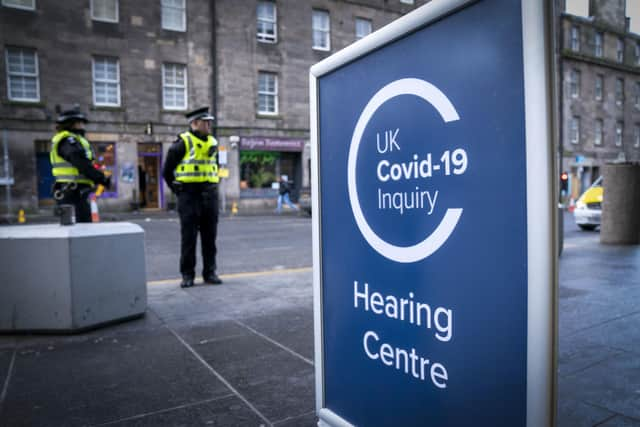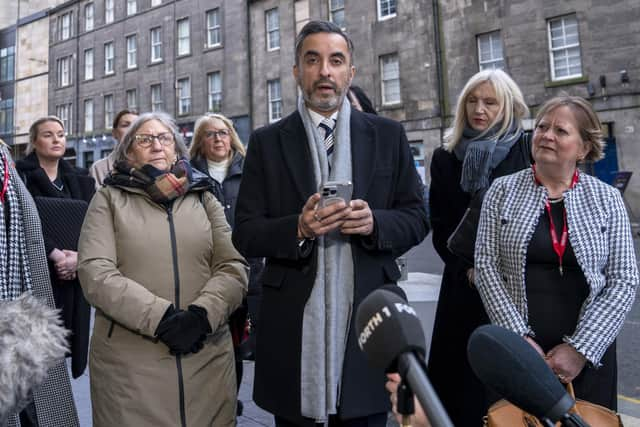Covid inquiry Scotland: Powerful testimony heard from families in Edinburgh as Nicola Sturgeon WhatsApp messages showdown looms
Decision makers were warned they would “sleepwalk” into making the same mistakes unless change was achieved through the UK Covid Inquiry, as the first day of proceedings in Scotland set up an anticipated showdown with senior politicians over the Scottish Government’s WhatsApp messages.
The multi-million pound inquiry has opened public hearings at Edinburgh’s International Conference Centre (EICC), where the chair of the inquiry, Lady Hallett, will hear from Scots impacted by the pandemic and Scotland’s decision makers.
Advertisement
Hide AdAdvertisement
Hide AdNicola Sturgeon, who has already given evidence to the UK Covid Inquiry in London, is expected to appear in a fortnight’s time. She is likely to be grilled on her pandemic-era WhatsApp messages after previously refusing to confirm whether she has handed them over.


The Scottish Government has handed over more than 14,000 electronic messages dating from the period to the inquiry, but the lead counsel to the inquiry, Jamie Dawson KC, said "very few appear to have been retained", despite an order not to destroy messages being issued.
Then-health secretary Humza Yousaf said at the time he had handed over “reams” of unredacted WhatsApp messages, with the First Minister giving no indication whether he will appear at the inquiry himself.
Mr Dawson told Lady Hallett that “with difficulty”, messages from 85 separate groups have been disclosed by the Scottish Government, totalling 28,000 messages.
“This effort, my lady, as I set out in the last preliminary hearing, has involved a number of requests,” Mr Dawson said. He added: “I am pleased to say that after a certain degree of political controversy over the issue, a large number of documents have now been made available to us.”


These include messages from “prominent ministerial decision makers” and others “in key advisory roles” within the Scottish Government.
Mr Dawson said the inquiry will hear more about the Scottish Government’s relationship with the UK Government, and reminded Lady Hallett that during the London hearings, former deputy first minister John Swinney said that “generally relationships between the administrations were pretty poor by that point, poor in the aftermath of Brexit”.
Ms Sturgeon also said relations were “generally pretty poor” during her testimony in London. The inquiry opened with filmed testimony from Scots who were bereaved by the pandemic and those who had personally suffered injury from the effects of Covid-19.
Advertisement
Hide AdAdvertisement
Hide AdAttendees heard how families had lost sisters, brothers, mothers, fathers and children. Disabled Scots told of their unique experiences of isolation, loneliness and vulnerability while the pandemic took hold.
One man with severe disabilities said he had been “forgotten about” by the UK and Scottish governments, while others suffering with long Covid called for greater healthcare.
One woman, who lost her partner when they both contracted Covid-19, ended the segment by warning: “If nothing changes, we’ll sleepwalk into making the same decisions again.”
During the afternoon session of the public hearing, the Scottish Covid Bereaved group took aim at the “toxic, misogynistic and macho atmosphere at the centre of [the UK] Government”.
Claire Mitchell KC, representing the group, told the Lady Hallett: “Boris Johnson’s inability to act decisively was repackaged with a philosophical spin, this lack of ability to harness what he considered to be the greatest tool in the pandemic – that of communication – was not reflected on with any form of acceptance.
“There have been many significant examples flagged up by an independent expert of his and his colleagues’ inability to properly define what rules were to be followed and by whom.”
The group also took aim at some sections of the UK media, saying there had been “calculated attempts to undermine the work of this inquiry” by some outlets, “including not only attacks on the work of the inquiry, but personal attacks on those involved”.
“It is clear such attacks have had no effect,” said Ms Mitchell. “However, the Scottish Covid Bereaved is clear, any attack on the work of the Covid Inquiry is an attack on the bereaved who want the work of this inquiry to be a legacy for those they loved and lost.”
Advertisement
Hide AdAdvertisement
Hide AdTwo charities – Inclusion Scotland and Disability Rights UK – were jointly represented by Danny Friedman KC, who told Lady Hallett that in the opinion of the two charities, “the social model and equal rights of disabled people remain a work in progress in Scotland and across the UK”.
Mr Friedman said: “It is not enough to recognise the value of disabled people’s lives. There must be redistribution. Redistribution of political resources, in terms of the influence that disabled people can have on the policies that affect them, and the redistribution of economic resources in the sense that if a society is serious about valuing the dignity and diversity of human life, disabled people will need more economic resources.”
A joint opening statement from the Trades Union Congress (TUC) and its Scottish counterpart (STUC) said research showed mortality differed across job sectors, representing “both the occupational risk and the social class gradient in health outcomes”.
“It all points to one of the profound consequences of the pandemic, that those who are generally less well off, with greater disadvantage and vulnerability, paid the greater price,” said Sam Jacobs, representing the TUC and STUC.
“It was as true of Scotland as it was across the UK. It was the price paid by people who kept parcels being delivered to our doors, who transported key workers to work, who processed our food, who stacked our shelves, who cared for our sick and elderly, and many others.”
A total of 12 sessions will be held at the EICC between January 16 and February 1. It is the first time UK Covid Inquiry hearings have taken place outside of London since the process began in August 2022.
Comments
Want to join the conversation? Please or to comment on this article.